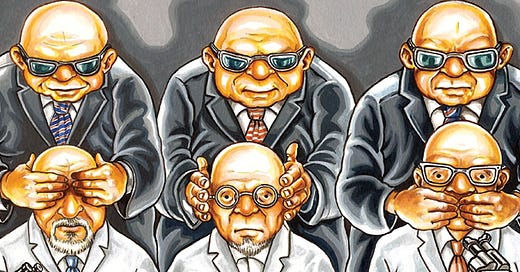Hot off the presses! "Censorship and Suppression of Covid-19 Heterodoxy: Tactics and Counter-Tactics"
Our Paper Was Just Published in Minerva, A Springer Journal in Social Studies of Science
Censorship and Suppression of Covid-19 Heterodoxy: Tactics and Counter-Tactics
Here’s a link to the paper, and a pdf is embedded down below. (But if you want to read it, please go to the link and download a pdf to show them how popular the article is.)
Abstract:
“The emergence of COVID-19 has led to numerous controversies over COVID-related knowledge and policy. To counter the perceived threat from doctors and scientists who challenge the official position of governmental and intergovernmental health authorities, some supporters of this orthodoxy have moved to censor those who promote dissenting views. The aim of the present study is to explore the experiences and responses of highly accomplished doctors and research scientists from different countries who have been targets of suppression and/or censorship following their publications and statements in relation to COVID-19 that challenge official views. Our findings point to the central role played by media organizations, and especially by information technology companies, in attempting to stifle debate over COVID-19 policy and measures. In the effort to silence alternative voices, widespread use was made not only of censorship, but of tactics of suppression that damaged the reputations and careers of dissenting doctors and scientists, regardless of their academic or medical status and regardless of their stature prior to expressing a contrary position. In place of open and fair discussion, censorship and suppression of scientific dissent has deleterious and far-reaching implications for medicine, science, and public health.”
The paper was published in Minerva: A Review of Science, Learning and Policy. It is a well-respected journal in the sociological and historical study of science and knowledge, currently published by Springer.
The paper was co-authored by myself, Yaffa Shir-Raz, Ety Elisha, Brian Martin and Natti Ronnel. (In some ways it is a follow-up piece to the past research we’ve done on censorship and suppression in vaccine science that I wrote about here.)
It is based on in-depth interviews with scientists and doctors around the world who have faced censorship and suppression due to their views on COVID-19. Many of the people we interviewed for the study are undoubtedly familiar to anyone reading this post, but we maintain their anonymity in the paper. Although the current stark reality of censorship and suppression is also undoubtedly familiar to most people reading this, it will be news to many outside our circles, and we felt there would be value in having it documented and discussed in the peer-reviewed academic literature.
Here is a pdf of the paper:
You can contrast this paper to a recent paper that was just published in the flagship journal of sociology, The American Sociological Review, to see what counts as cutting-edge sociology these days: “Online Conspiracy Groups: Micro-Bloggers, Bots, and Coronavirus Conspiracy Talk on Twitter”
Abstract:
“Conspiracies are consequential and social, yet online conspiracy groups that consist of individuals (and bots) seeking to explain events or a system have been neglected in sociology. We extract conspiracy talk about the COVID-19 pandemic on Twitter and use the biterm topic model (BTM) to provide a descriptive baseline for the discursive and social structure of online conspiracy groups. We find that individuals enter these communities through a gateway conspiracy theory before proceeding to extreme theories, and humans adopt more diverse conspiracy theories than do bots. Event-history analyses show that individuals tweet new conspiracy theories, and tweet inconsistent theories simultaneously, when they face a threat posed by a rising COVID-19 case rate and receive attention from others via retweets. By contrast, bots are less responsive to rising case rates, but they are more consistent, as they mainly tweet about how COVID-19 was deliberately created by sinister agents. These findings suggest human beings are bricoleurs who use conspiracy theories to make sense of COVID-19, whereas bots are designed to create moral panic. Our findings suggest that conspiracy talk by individuals is defensive in nature, whereas bots engage in offense.”
<insert eyeroll emoji here>
By the way, the annual meeting of the American Sociological Association was held in L.A. in August of this year. They required proof of having had original + booster vaccination (no exemptions) and indoor mask wearing, even though L.A. did not have a mask mandate at that time. Both of these were apparently enforced by police who were hired by the ASA.
And the kicker? The theme of this year’s meeting was “Bureaucracies of Displacement.” I wonder how many of us were displaced from the conference by their absurd, anti-science bureaucratic rules. I am so deeply disappointed. Sociologists are supposed to be such critical thinkers.





Wow! Brilliant. I will share the abstract (yours not the "bot" one :-) ) on facebook groups. I firmly believe that showing people how the magic trick is done like this is key to waking people up to the propaganda and censorship tricks! Criticism and questioning is not dis/mis/mal/information!
This is such important work that you've done. Thank you for staking this strong and revealing position about censorship, its perpetrators, and its victims, and its implications. In Dune, it was said that fear is the mind-killer, the little death.
Fear of being able to speak the truth is something that could crush the individual human spirit, and even whole human civilizations. Fear-based totalitarian systems are to be fought against by as many as possible, everywhere as possible, and for as long as possible.
This piece you put together is an important force-multiplier for the ability to speak truth to power.
Thanks again.